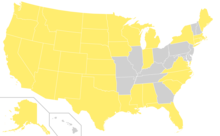Tribe (Native American)

In the United States, an American Indian tribe, Native American tribe, Alaska Native village, Indigenous tribe, or Tribal nation may be any current or historical tribe, band, or nation of Native Americans in the United States. Modern forms of these entities are often associated with land or territory of an Indian reservation. "Federally recognized Indian tribe" is a legal term in United States law with a specific meaning.
A Native American tribe recognized by the United States government possesses tribal sovereignty, a "domestic dependent, sovereign nation" status[1] with the U.S. federal government that is similar to that of a state in some situations, and that of a nation in others, holding a government-to-government relationship with the federal government of the United States.
Many terms used to describe Indigenous peoples of the United States are contested but have legal definitions that are not always understood by the general public.
Legal definition in the United States
[edit]The term tribe is defined in the United States for some federal government purposes to include only tribes that are federally recognized by the Bureau of Indian Affairs (BIA), and those Alaska Native tribes established pursuant to the Alaska Native Claims Settlement Act [43 U.S.C. 1601 et seq.]. Such tribes, including Alaska Native village or regional corporations recognized as such, are known as "federally recognized tribes" and are eligible for special programs and services provided by the United States. The BIA, part of the US Department of the Interior, issues Certificate of Degree of Indian Blood, which tribes use as a basis for tribal enrollment in most cases. Federally recognized tribes are "unique governmental entities and are not extensions of State or local governments."[1]
Some tribes, such as the United Houma Nation, do not have federal recognition, but are recognized at the state level using procedures defined by various states, without regard to federal recognition. Other organizations self-identify as Native American tribes for a variety of reasons; they may be a scattered tribe who no longer exist as an organized nation, or they have not completed the certification process established by the government entities in question, they may have lost their recognition through termination, or they may be a group of non-Native individuals seeking recognition as a tribe for other reasons.
Some federally recognized tribes are confederacies of more than one tribe. Historically, the State of California formed rancherias and Nevada formed Indian Colonies. Multiethnic entities were formed by the U.S. federal government or by treaty with the U.S. government for the purpose of being assigned to reservations. For example, 19 tribes that existed in 1872 combined at that time to form the Colville Confederated Tribes, which is now the single federally recognized tribe, Colville Indian Reservation in Washington state.
Other uses
[edit]The international meaning of the English word tribe is a people organized with a non–state government, who typically claim descent from a common founder and who speaks the same language.
In addition to their status as legal entities, tribes have political, social, and historical rights and responsibilities. The term also refers to communities of Native Americans who historically inhabit a particular landbase and share a language and culture.[2]
See also
[edit]- Classification of Indigenous peoples of the Americas
- Indian reservation
- Indigenous peoples in Canada
- List of Alaska Native tribal entities
- List of federally recognized tribes in the United States
- List of federally recognized tribes by state (USA)
- List of organizations that self-identify as Native American tribes
- Native American name controversy
- Native Hawaiians
- State-recognized tribes in the United States
- Tribal council
- Tribal sovereignty
References
[edit]- ^ a b "Tribal Protocol Manual (NUREG-2173, Revision 1)". U.S. Nuclear Regulatory Commission. Retrieved July 18, 2024.
- ^ "Tribal Nations FAQs". United States Department of Energy.
External links
[edit]Text is available under the CC BY-SA 4.0 license; additional terms may apply.
Images, videos and audio are available under their respective licenses.
